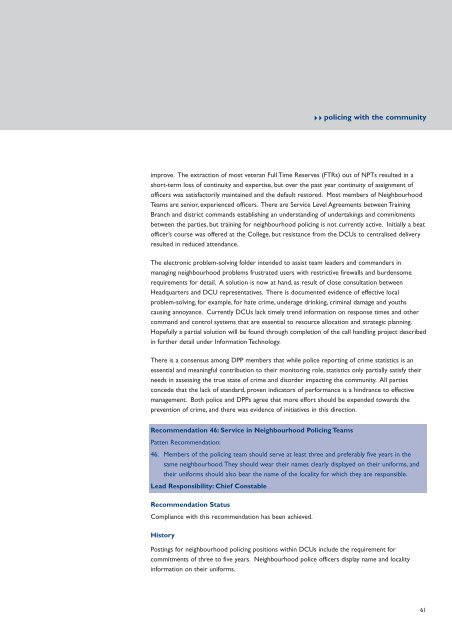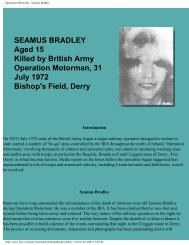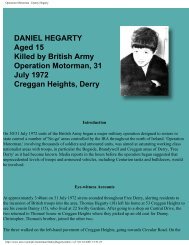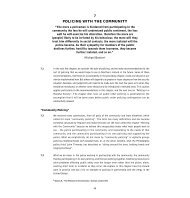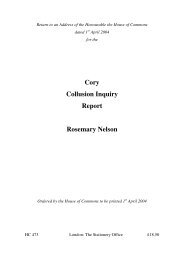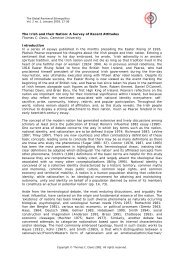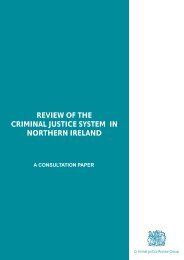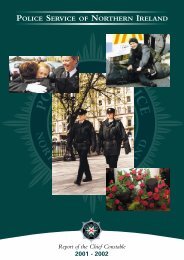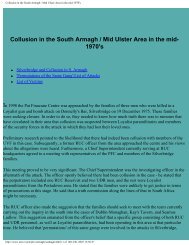11293 report 19 - CAIN - University of Ulster
11293 report 19 - CAIN - University of Ulster
11293 report 19 - CAIN - University of Ulster
Create successful ePaper yourself
Turn your PDF publications into a flip-book with our unique Google optimized e-Paper software.
policing with the communityimprove. The extraction <strong>of</strong> most veteran Full Time Reserves (FTRs) out <strong>of</strong> NPTs resulted in ashort-term loss <strong>of</strong> continuity and expertise, but over the past year continuity <strong>of</strong> assignment <strong>of</strong><strong>of</strong>ficers was satisfactorily maintained and the default restored. Most members <strong>of</strong> NeighbourhoodTeams are senior, experienced <strong>of</strong>ficers. There are Service Level Agreements between TrainingBranch and district commands establishing an understanding <strong>of</strong> undertakings and commitmentsbetween the parties, but training for neighbourhood policing is not currently active. Initially a beat<strong>of</strong>ficer’s course was <strong>of</strong>fered at the College, but resistance from the DCUs to centralised deliveryresulted in reduced attendance.The electronic problem-solving folder intended to assist team leaders and commanders inmanaging neighbourhood problems frustrated users with restrictive firewalls and burdensomerequirements for detail. A solution is now at hand, as result <strong>of</strong> close consultation betweenHeadquarters and DCU representatives. There is documented evidence <strong>of</strong> effective localproblem-solving, for example, for hate crime, underage drinking, criminal damage and youthscausing annoyance. Currently DCUs lack timely trend information on response times and othercommand and control systems that are essential to resource allocation and strategic planning.Hopefully a partial solution will be found through completion <strong>of</strong> the call handling project describedin further detail under Information Technology.There is a consensus among DPP members that while police <strong>report</strong>ing <strong>of</strong> crime statistics is anessential and meaningful contribution to their monitoring role, statistics only partially satisfy theirneeds in assessing the true state <strong>of</strong> crime and disorder impacting the community. All partiesconcede that the lack <strong>of</strong> standard, proven indicators <strong>of</strong> performance is a hindrance to effectivemanagement. Both police and DPPs agree that more effort should be expended towards theprevention <strong>of</strong> crime, and there was evidence <strong>of</strong> initiatives in this direction.Recommendation 46: Service in Neighbourhood Policing TeamsPatten Recommendation:46. Members <strong>of</strong> the policing team should serve at least three and preferably five years in thesame neighbourhood.They should wear their names clearly displayed on their uniforms, andtheir uniforms should also bear the name <strong>of</strong> the locality for which they are responsible.Lead Responsibility: Chief ConstableRecommendation StatusCompliance with this recommendation has been achieved.HistoryPostings for neighbourhood policing positions within DCUs include the requirement forcommitments <strong>of</strong> three to five years. Neighbourhood police <strong>of</strong>ficers display name and localityinformation on their uniforms.61


